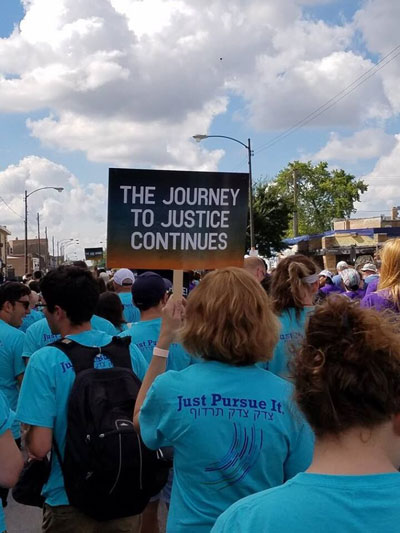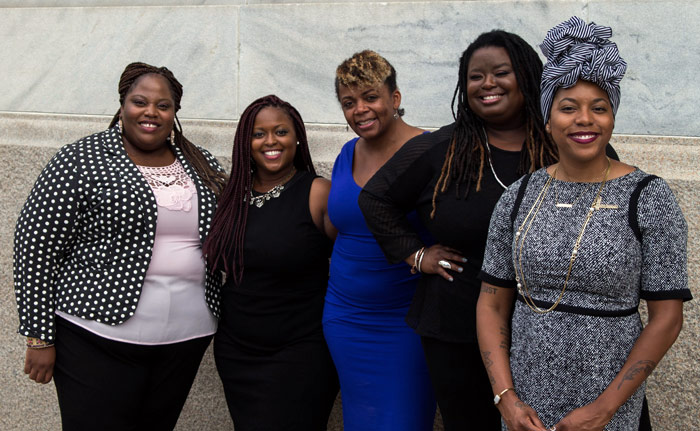Grassroots Organizing & Movement Building
Growing grassroots support is critical to addressing long-entrenched inequities in our society. We believe that working together to identify common problems and solutions across movements helps facilitate durable change by demonstrating the power of a diverse range of groups working together. Examples include:

Standing Together for Change
In the summer of 2010, Damian Turner, a charismatic youth advocate and aspiring musician was gunned down in a drive-by shooting four blocks from the University of Chicago Medical Center (UCMC) a few weeks before his 19th birthday. With no Level I trauma center on the entire South Side of Chicago, despite that area’s being disproportionately affected by gun violence, Damian had to be driven nearly 10 miles north to the closest center where he died not long after arriving. It’s impossible to know how many similar tragedies could have been averted if a closer center existed.
Damian’s death sparked a community-led campaign, the Trauma Care Coalition, which grew into a powerful collaboration of community organizations, faith leaders and students dedicated to reopening a Level-I adult trauma center at UCMC. The Jewish Council on Urban Affairs (JCUA), a long-time Foundation grantee, joined the coalition as a full member in 2015. As a member, JCUA mobilized Jewish clergy, leaders and community members to action, leveraged relationships to access decision makers at the University of Chicago and became a key ally to organizations and communities directly affected by the lack of trauma care.
JCUA joined the coalition to take a stand for more comprehensive and equitable trauma care for all Chicagoans. The organization and its members know that the needs of all can only be addressed if there is sufficient public will to act together to elevate our shared humanity. JCUA believes that remembering the story of the Jewish people’s enslavement and liberation in Egypt, as the Torah insists, points toward a responsibility to undermine oppression wherever it exists. It means safeguarding the dignity, economic security and inclusion of structurally vulnerable people on the margins of the economy. It represents an obligation to preserve life that supersedes nearly everything else.
Because of the work of the Trauma Care Coalition, on December 17, 2015, the University of Chicago announced it would open a Level-I adult trauma center on its medical campus in Hyde Park. This plan was unanimously approved by the Illinois Health Facilities and Services Review Board on May 10, and the trauma center is expected to open in early 2018. The campaign was successful because a focused, powerful coalition was built across many community organizations, each with its unique strengths. Because of this coalition’s efforts, an urgent and life-saving need will be more equitably served.
Black Mamas Matter: Seeding Grassroots Movements to Drive Change
There is a maternal health crisis facing black women in the United States. After decades of declining maternal mortality and morbidity rates (MMR), the United States is one of only 13 countries in the world that has experienced an increase during the last 15 years. While this affects all women, black women in particular face a disproportionately higher risk, even when controlling for education levels and socio-economic status. A black woman in the U.S. is three to four times more likely to die from pregnancy-related causes than a white woman, and twice as likely to suffer from severe maternal morbidity (SMM). In the face of this crisis, IHF is helping to seed a movement in the U.S. for black women’s maternal health, rights and justice through targeted support for SisterSong and the Center for Reproductive Rights.
 These two organizations, along with the National Latina Institute for Reproductive Health, released a 2014 Human Rights Shadow Report documenting the extreme MMR disparities. That year, Monica Simpson from SisterSong presented the findings from this report to the U.N. Committee on the Elimination of Racial Discrimination in Geneva, bringing needed international attention to the impact of racial discrimination in the U.S. Building on the momentum, SisterSong and CRR deepened their collaboration to organize key stakeholders and grow support for collective action. Activists, health providers, researchers and IHF and other funders came together in Atlanta in 2015 for the first Black Mamas Matter (BMM) convening, which then grew into a more formal network through coordination, support and information sharing by CRR and SisterSong.
These two organizations, along with the National Latina Institute for Reproductive Health, released a 2014 Human Rights Shadow Report documenting the extreme MMR disparities. That year, Monica Simpson from SisterSong presented the findings from this report to the U.N. Committee on the Elimination of Racial Discrimination in Geneva, bringing needed international attention to the impact of racial discrimination in the U.S. Building on the momentum, SisterSong and CRR deepened their collaboration to organize key stakeholders and grow support for collective action. Activists, health providers, researchers and IHF and other funders came together in Atlanta in 2015 for the first Black Mamas Matter (BMM) convening, which then grew into a more formal network through coordination, support and information sharing by CRR and SisterSong.
Members of the network drove increased media attention to the issue including pieces in Ebony Magazine, the Root and Women’s E-News. CRR and SisterSong and members also partnered to create the Black Mamas Matter Toolkit, a policy resource for advocates who are concerned about the health and well-being of black women and girls published in June 2016. The toolkit has already strengthened grassroots organizing and advocacy efforts in Louisiana, Georgia and Texas as well enhanced the issue’s profile in the context of national policy conversations. In the summer of 2016, Monica Simpson provided testimony to the DNC platform committee on behalf of the growing BMM network and successfully worked to ensure maternal health disparities were included as a priority in the party’s platform.
In November 2016, IHF continued to demonstrate support for Black Mamas Matter’s grassroots network building and shared leadership model by funding a leadership retreat through SisterSong. Network leaders developed collective vision, values and goals statements and created a more formalized leadership structure to foster alignment and advance priorities, launching the Black Mamas Matter Alliance. Led by a steering committee of five network leaders from the fields of maternal health, human rights and reproductive justice, the Alliance drives cross-sector efforts to address racial disparities in maternal health including: research, policy advocacy and culture change strategies, centered on the experiences and expertise of black women. This work reflects the Foundation’s belief in supporting grassroots leaders and community driven change to advance strategic interests in both early childhood and reproductive health. We look forward to seeing the impact of Black Mamas Matter Alliance members as they build a movement for black maternal health, rights and justice.